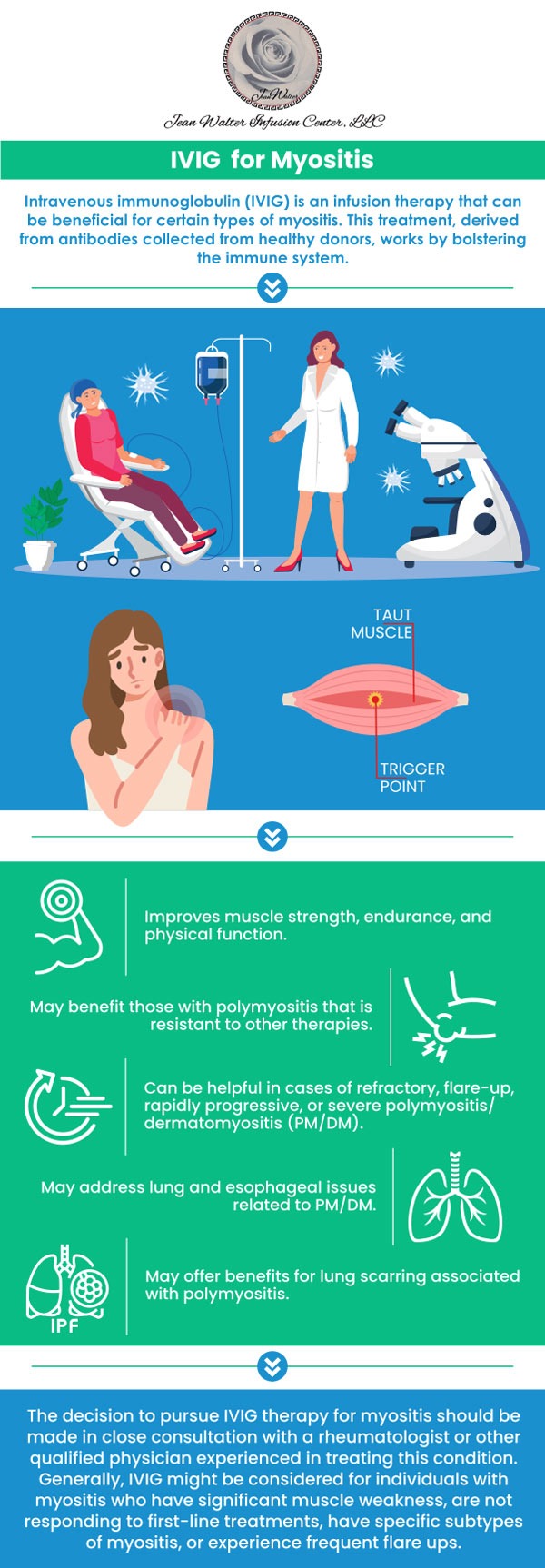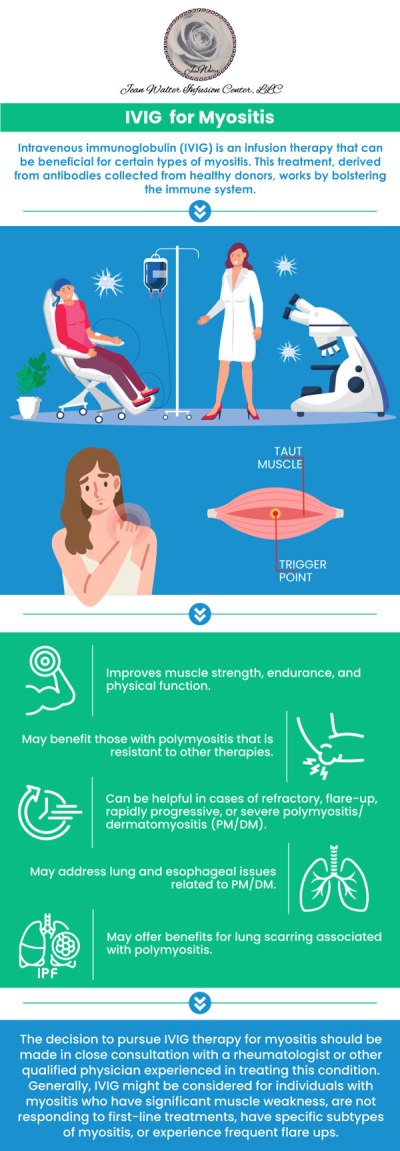Understanding Myositis: Causes, Symptoms, and Treatment Options
Patients with antibody deficits may benefit from intravenous immunoglobulin (IVIG) therapy. Patients with resistant skin conditions like myositis can benefit from intravenous immunoglobulin (IVIg) treatment as the therapy may stop the immune system from destroying muscle cells. Dr. Nasser Nasseri, MD, and his dedicated team offer intravenous immunoglobulin therapy for myositis at Jean Walter Infusion Center. For more information, contact us or book an appointment online. We have convenient locations to serve you in Edgewater MD, Rosedale MD, North Baltimore MD, Columbia MD, Glen Burnie MD, and Catonsville MD.




Table of Contents:
What are the first signs of myositis?
What is myositis caused by?
Is myositis a serious illness?
What is the infusion treatment for myositis?
How Does Dr. Nasser Nasseri Manage Myositis at Jean Walter Infusion Center?
Recognizing the early signs of myositis is crucial for timely diagnosis and treatment. While symptoms vary among individuals, some of the most common initial signs of myositis include:
• Muscle weakness – This presents as difficulty in performing everyday tasks like lifting objects, climbing stairs, or getting up from a seated position.
• Muscle pain and tenderness – Feeling pain or tenderness in the muscles, often accompanied by stiffness or soreness, is an early sign of myositis.
• Fatigue – Persistent feelings of tiredness and lack of energy, even after sufficient rest, can signify myositis.
• Joint pain – Myositis commonly causes discomfort in the joints, such as the wrists, fingers, knees, and ankles.
• Trouble swallowing or speaking – Difficulty swallowing food or liquids or experiencing speech difficulties can point to myositis.
• Skin changes – Myositis can cause rashes, redness, and swelling in the affected areas of the body.
If you are experiencing any of these warning signs, it’s critical to consult a healthcare professional for a proper evaluation and diagnosis. Early intervention will help manage myositis symptoms, prevent complications, and improve your overall quality of life.
Myositis is a condition characterized by inflammation and damage to the muscles. There are several factors that can contribute to the development of myositis, including:
• Autoimmune disorders – Myositis is often associated with autoimmune diseases, such as dermatomyositis and polymyositis.
• Infections – Certain viral or bacterial infections, such as influenza, HIV, and Lyme disease, can trigger myositis.
• Environmental triggers – Exposure to certain environmental factors, such as toxins and chemicals, increases your risk of developing myositis.
• Genetic factors – Some forms of myositis have a genetic component, meaning they can be inherited or have a familial predisposition.
• Medications – In rare cases, certain medications, such as statins used to lower cholesterol and specific antibiotics, can cause myositis as a side effect.
The exact cause of myositis varies from person to person, and in many cases, it is a combination of multiple factors. If you suspect you have myositis or have concerns about your muscle health, consult our healthcare professional for a comprehensive evaluation.
Yes, myositis is a serious illness that requires medical attention and symptom management. While the severity of myositis varies, it is important to take the condition seriously. There are several considerations for myositis patients:
• Treatment and management – While there is no cure for myositis, it can be managed with a combination of treatments. Regular monitoring and follow-up with a healthcare provider are essential.
• Potential complications – In some cases, myositis can lead to complications such as difficulty swallowing, respiratory problems, and inflammation of other organs.
• Impact on daily life – Myositis causes muscle weakness, fatigue, and difficulty performing daily tasks, which can significantly and negatively affect a person’s quality of life.
Infusion therapy is one of the best treatment options for myositis. It involves the administration of medication and nutrients directly into the bloodstream through an intravenous (IV) line. In the case of myositis, intravenous immunoglobulin (IVIG) is often used in the infusion. Here’s what to expect from infusion treatment for myositis:
• IVIG – Intravenous immunoglobulin is a solution containing antibodies that regulate the immune system and reduce inflammation in the muscles.
• Frequency and duration – The ideal frequency and duration of infusion treatment will depend on your condition and response to therapy. Some people require infusions every few weeks, while others may need them less frequently.
• Monitoring – During the infusion, you will be closely monitored by healthcare professionals to ensure safety and effectiveness. Vital signs, such as blood pressure and heart rate, may be monitored throughout the procedure.
• Potential side effects – While infusion therapy is generally safe, it sometimes causes side effects such as headache, fatigue, fever, or allergic reaction. Your healthcare team will closely monitor you for any adverse reactions and take appropriate measures if needed.
Dealing with the muscle weakness and inflammation associated with myositis requires specialized, expert intervention. Dr. Nasser Nasseri, MD, and the dedicated team provide advanced treatment options for patients battling this rare group of autoimmune diseases, including dermatomyositis and polymyositis. Myositis occurs when the immune system mistakenly attacks healthy muscle tissue, leading to persistent fatigue, muscle pain, and difficulty with daily movements.
Under Dr. Nasseri’s leadership, our Maryland clinics offer cutting-edge IVIG (Intravenous Immunoglobulin) therapy, which delivers essential antibodies to help modulate the immune response and reduce harmful inflammation. This targeted approach is designed to improve muscle strength, enhance mobility, and prevent further tissue damage. Every treatment plan is personalized, ensuring that the dosage and frequency align with your specific symptoms and health goals. By choosing the Jean Walter Infusion Center, you are accessing high-quality, professional care in a supportive environment dedicated to helping you regain your strength and quality of life.
Intravenous immunoglobulin (IVIG) is used to treat a variety of immunological deficiencies and inflammatory diseases. For more information, contact us or book an appointment online. We have convenient locations to serve you in Rosedale MD, North Baltimore MD, Columbia MD, Glen Burnie MD, Edgewater MD, and Catonsville MD. We serve patients from Rosedale MD, Baltimore MD, Edgewater MD, Columbia MD, Glen Burnie MD, Catonsville MD, North Baltimore, Parkville MD, Middle River MD, Dundalk MD, Halethrope MD, Ellicott City MD, Laurel MD, Hebbville MD, and Woodlawn MD.
Check Out Our 5 Star Reviews

Additional Services We Offer


- Infusion Therapy
- Injection Treatments
- Intravenous Immunoglobulin Therapy
- Medical Conditions
- Asthma
- Crohn’s Disease
- Fibromyalgia
- Gout
- Inflammatory Eye Disease
- Inflammatory Skin Disease
- Iron Deficiency
- Lupus
- Multiple Sclerosis
- Myositis
- Osteoporosis
- Rheumatoid Arthritis
- Ulcerative Colitis
- Vasculitis
- PRP Injections






